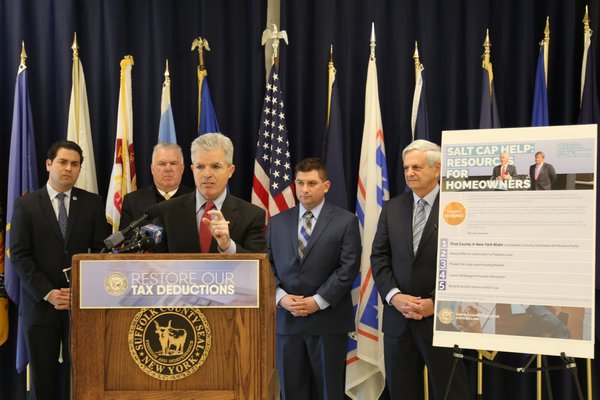In Suffolk County, the fight to uncap the deduction of state and local taxes, which was limited to $10,000 by the 2017 federal tax law, is being fought on two fronts.
On the local level, Suffolk County Executive Steve Bellone is planning a “charitable gift reserve fund” as an end-run around the new law. It’s designed to allow the county’s homeowners to be able to receive a full federal deduction for the cost of their property taxes by instead paying them as a charitable donation. On the federal level, U.S. Rep. Lee Zeldin (R-Shirley) is working with a bipartisan coalition toward reinstating the deduction, known as SALT, for “state and local taxes.”
Before the new tax law, sales, income and property taxes paid were deductible when determining taxable income at the federal level, and there was no cap on the deduction. With SALT deductions now capped at $10,000 — and the standard deduction pegged at $12,200 for single filers and $24,400 for married couples for 2019 — the tax benefit of being a homeowner in New York has become nonexistent for many. It also means the same money is being taxed twice, first by local and state governments, and then by the federal government.
Zeldin, representing New York’s 1st Congressional District, was one of 12 Republicans who voted against the GOP tax bill, based largely on the inclusion of a cap on SALT deductions. He renewed his call to reinstate SALT during a House floor speech on Wednesday, March 13. House members joining him in the effort are fellow Long Island congressmen Peter King (R-Seaford) and Tom Suozzi (D-Glen Cove), as well as Rep. Nita Lowey (D-Westchester) and Rep. Josh Gottheimer (D-New Jersey).
“It was a geographic redistribution of wealth that impacted too many,” Zeldin said during a phone interview the day following his floor speech, explaining his 2017 vote against his party’s tax bill. Now, Zeldin expresses optimism that the plan to uncap SALT will gain traction in the House.
“I believe that it has the support to pass in the House of Representatives,” he said. “The House Ways and Means Committee has members who are very interested and focused on the issue. Hopefully, the Ways and Means Committee passes legislation and sends it to the floor to send over to the Senate.”
He said that he expects the House to act on reinstating SALT before the Senate acts, and that Senate action will require an effort on the part of U.S. Senate Minority Leader Charles Schumer (D-NY) and others in the Senate. But because New York is among the states affected most by the new measure, it’s likely that the senator will support the effort.
“I believe Senator Schumer and his conference would be more inclined to support a change,” Zeldin said. “So whatever I can do to assist him and his colleagues with that effort in their chamber, I certainly would offer myself to help however they think would be best. And also advocating directly with the administration — the White House, with the president, directly.”
The Democrats wrested control of the House of Representatives from the Republicans in the 2018 election, and U.S. Rep. Richard Neal (D-Massachusetts), became chairman of the Ways and Means Committee, the House’s chief tax-writing committee.
“The leadership of the Democratic Party appears to be more inclined to make a change to the SALT deduction, and I have been eagerly working with them on ideas to help make that happen, even though I’m in another party,” Zeldin said. “It shouldn’t matter whether you’re a Republican or Democrat when fighting for these important issues.”
But, according to Zeldin, the negative impact that the tax bill had on LI is overstated.
“Some people like to attempt a branding of the tax bill as if Long Island is about to capsize and tip over in the Atlantic Ocean because of its devastating impact across the board on all Long Islanders, and that’s not the case,” he said. “Approximately half of [1st Congressional District] residents were previously standard deduction. They all benefited from the tax bill. They’re paying less now because of it. They are not paying more.
“As far as the itemizers in the 1st Congressional District, there are many who are paying less in taxes and not more,” he continued. “There were many different changes that were made in that tax bill. And some people, those changes benefited them more than the change to the SALT deduction impacted them negatively. My opposition to the tax bill was based primarily on the fact that too many were going to have to pay more, not because everyone was going to have to pay more.”
He added that he does not believe that reducing the corporate tax rate should be paid for by making personal income taxes higher.
“It’s just something that I don’t believe fundamentally is the right approach toward providing relief on the corporate tax side,” he said. “I’m happy that the corporate tax rate was reduced, but I don’t believe that this is the way to do it.”
Zeldin said he is working with Gottheimer, his colleague from across the aisle, to brainstorm options to pay for reinstating SALT, such as closing loopholes in the tax code that benefit wealthy individuals who have avoided paying taxes.
“We also have someone scoring these various proposals for us voluntarily — someone who used to work for the Congressional Budget Office — so we can see how the CBO would be scoring these various proposals,” Zeldin said. “And then based off those numbers that we get back, we’ll make a decision as to which ones to include.”
Zeldin noted in his floor speech that New York is one of most taxed states in the nation, and said that while SALT should be reinstated, New York also needs to reduce the tax burden on its residents.
“As I pointed out in my floor speech, what’s very important is for all of us to understand that the reason why our deduction was so high was because our state and local taxes are so high,” Zeldin said. “And all levels of government need to do their part to provide tax relief—especially the New York State government up in Albany. We have some of the highest tax rates in the entire country, one of the worst business climates in the entire country. And while Washington is, hopefully, doing their part, the elected officials in Albany will, hopefully, do their part.”
He said the three biggest tax concerns in New York are income taxes, property taxes and sales taxes.
“If we just were paying one at the rate that we were, it wouldn’t be much of an issue,” he said. “But when you have one of the highest income tax rates, one of the highest property tax rates, and one of the highest sales tax rates, it really adds up. And Albany needs to pursue efficiencies, especially with the size that its Medicaid program has grown to. And pursuing those efficiencies allows state officials to … pursue tax relief for New Yorkers.”
This week, the New York State Legislature made the 2 percent cap on annual tax levy increases permanent. The measure was instituted in 2011 to slow the growth of property taxes and was set to expire next year. Zeldin, a former state senator who was first elected to office in Albany in 2010 — the same year that Gov. Andrew Cuomo was first elected governor — supports the tax cap.
“New York State had reached its breaking point with the size of property taxes when that tax cap was enacted,” Zeldin said.
He added that Albany should also pursue mandate relief.
“Approximately 70 percent of our property taxes go to our local schools districts, and there are efficiencies to be found with regards to our schools as well,” he said. “We need to be delivering a quality education to our children and finding ways to make it more affordable. There are ways that the federal government can provide mandate relief. There are ways that the state government can provide mandate relief. And I believe that whenever the federal or state government is going to pass along a mandate to a local school district, that it should fund it. You either fund what you want to mandate, or you don’t require it.”
On the county level, Bellone is pursuing the “charitable gift reserve” plan that was suggested by the governor. According to the county executive’s office, Suffolk would be the first county in New York to establish the reserve to protect homeowners from the new tax law.
The IRS last year proposed regulations to ensure that charitable gifts that result in a corresponding state or local tax credit will not be eligible for a federal tax deduction. However, Bellone remained undeterred.
“My message to the IRS is clear: If you try to stop us from protecting our SALT deductions, we will see you in court,” the county executive said in a statement earlier this month. “Governor Cuomo took the lead in fighting back against the federal SALT tax law with a plan to protect localities, and, today, we are following that guidance prescribed by state law. And while we continue to push for Congress to restore these tax deductions, Suffolk County will not wait for Washington to act.”
Bellone’s plan also calls for reducing mortgage fees and freezing them for three years, and increasing access to affordable housing programs for young people with student loan debt.
This article first appeared in The Southampton Press.
































